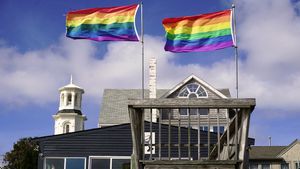The U.S. Public Health Service Commissioned Corps -- part of the Department of Health and Human Services -- announced Thursday, on World AIDS Day, that it is changing its policies to allow future applicants living with HIV and chronic hepatitis B to join.
In its announcement, the USPHS Commissioned Corps said that those living with HIV or chronic hepatitis B had previously been found to be medically disqualified. The new standards change that.
Thanks to treatments developed in recent years, living with both conditions have become manageable. The USPHS Commissioned Corps said managing the two conditions are now like managing high blood pressure.
"We want to encourage people to serve their country and for people in the medical and public health fields to be able to serve their country in the United States Public Health Service," Admiral Rachel Levine, the Assistant Secretary for Health, told The Advocate. "Because of these medical advances, there's no reason why patients with HIV and hepatitis, who meet the criteria in terms of their medical stability, can't serve."
Applicants living with HIV who are on treatment with antiretroviral therapy, are undetectable, and show no evidence of impaired immunity won't be rejected due to the condition. Similarly, applicants with chronic hepatitis B who have a low viral blood level and have no severe liver damage won't either.
The USPHS Commissioned Corps is a uniformed service of the U.S. government and works to protect and advance the country's public health. Almost 6,000 officers serving in the corps work in various aspects of the medical field -- some may work on COVID-19 prevention while others will work with unaccompanied minors at the U.S. border. Officers are also called to areas affected by natural disasters.
Levine noted the importance of the announcement coming out on World AIDS Day. She said what she calls "medical miracles" have advanced HIV treatment to what was unimaginable years ago like PrEP and treatment to suppress viral levels so people living with HIV can become undetectable. "We have made so much progress and this highlights the progress we have made -- but we're still not there yet," she said.
Still, the assistant secretary lauded the policy change of the agency.
"We're really very, very proud of the United States Public Health Service Commissioned Corps that we're able to break these barriers and allow these qualified people to serve their country," Levine said.
The new medical standards take effect on December 1.










































































